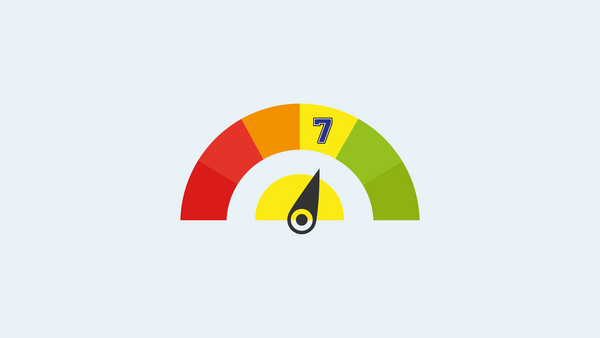I used to think that journaling was a waste of time.
Don’t get me wrong, I’ve journaled for a long time. If there is a format, you can rest assured that I’ve tried it out.
Reflective, Daily, 5-Bullet, Visual, Stream of Consciousness, Gratitude. I’ve even kept a journal of every meal I’ve had over a three-month period.
It is interesting to look back at entries from years ago and reflect on memories. But, with most of these formats, I never felt like they were improving my life. During my journal reviews, which I do every 90 days, I would notice that the same challenges kept showing up over and over.
Journaling simply wasn’t improving my quality of life.
I’ve only recently settled on a format that works the best for me. But, it’s not the type of journaling that is working.
The difference maker is that I added ratings, with one specific rule.
I don’t allow myself to score anything with a seven.
I’m going to do my best to convince you that the number seven is the equivalent of “meh.”
A data-driven approach to life
It is interesting to me that humans are very data-driven in most aspects of our life, except when it comes to measuring how our life is going.
Any sports fan can tell you the stats of their favorite player. Jordan won six championships. Don Mattingly, my favorite baseball player, I have his rookie card, had a career batting average of .307.
We know how many years we have been married, I’m coming up on my 20th anniversary in less than a week.
And so on.
But, for some reason, we fail to track data related to how our life is going.
Insert any number of sayings on this topic. The reality is that what you measure is what you will strive to improve.
The Lake Wobegon Effect - inverted
In lots of instances, humans have the tendency to overestimate things. It’s a phenomenon called The Lake Wobegon Effect.
I’ve noticed that when it comes to rating how things are going, I tend to underestimate things, i.e. I focus on the bad rather than the good. Which pushes me toward sevens.
The Problem with 7
In a ten-point rating system, a seven is a cop-out. It’s a safe vote. It means that things aren’t good and they aren’t bad. They are just, meh.
I’m not the only one who thinks this way. I recently finished my friend Chris Marr’s book, The Authoritative Coach.
In his book, Chris says the following.
It’s safe, it’s average. It’s saying that we’re not doing badly, but we’re not excelling either. 7 is a great number to choose if you don’t want to be overly self-critical. 7 is a way to escape a potentially difficult but important conversation. In order to know what work we need to do, we need a truly honest score.
The problem with a score of seven is that it doesn’t encourage you to improve things.
Dodging 7s
I’m so adamant about dodging sevens that during a recent call when asked to score something, I told the researcher that I refused to use the score.
If you have a tendency to use a seven a lot when you rate things, try this.
I use a score of six when something needs a small improvement. When it is not quite up to the level I’d like, but also not bad enough that it warrants immediate attention.
An eight signifies something really good, and it would only need a small tweak to hit a nine. I don’t give out tens.
Rating the 5 Fs
My advice is that you shoot for eight or higher. When you find something that is a six or less, either figure out how to improve it or get rid of it.
Of course, you need to be tracking those scores in the first place.
I recommend starting with rating the following categories in your life and updating them on a quarterly basis: family, finance, fitness, faith, and fun.
Forcing yourself to score things this way will give you a regular snapshot of how things are going and where you need to focus on improvements.
By the way, how would you rate this article? Don’t say it…
